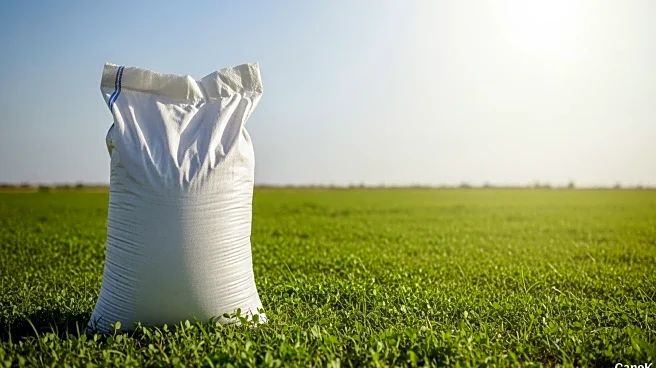What is the story about?
What's Happening?
The Chemical Industries of Senegal (ICS) has delivered a record 105,000 tons of fertilizer for the 2025-2026 agricultural campaign, significantly surpassing the previous year's supply of 70,000 tons. This initiative is part of a strategic collaboration with the Ministry of Agriculture, Food Sovereignty, and Livestock (MASAE) to ensure a successful agricultural season. The ICS's proactive approach, focusing on production and storage, has enabled a consistent supply chain, benefiting producers across Senegal. The delivery included 93,000 tons distributed between June and July 2025, ensuring a steady supply to authorized distributors. Additionally, ICS launched the ICS Agricultural Support Program (PICSA) to enhance the national agricultural sector's performance through training, input distribution, and capacity building.
Why It's Important?
This development is crucial for Senegal's agricultural sector, as it aims to bolster food sovereignty and support rural communities. By increasing fertilizer availability and reducing costs, ICS is helping to make agricultural inputs more accessible to farmers, which can lead to increased productivity and resilience against climate change. The reduction in fertilizer prices, such as the NPK 15-15-15 and NPK 6-20-10, provides financial relief to farmers, potentially increasing their profit margins. This initiative not only strengthens the agricultural supply chain but also positions ICS as a key player in supporting Senegal's national agricultural policy and economic stability.
What's Next?
The ICS's efforts are expected to continue with further support for the agricultural sector through the PICSA program, which initially supports 60 producers across five major agroecological zones in Senegal. The program's expansion could lead to broader impacts on food security and rural development. Stakeholders, including the government and agricultural communities, may anticipate further collaborations and initiatives aimed at enhancing agricultural resilience and sustainability. The ongoing commitment to reducing input costs and improving supply chain efficiency will likely remain a focus for ICS and its partners.
Beyond the Headlines
The ICS's initiatives highlight the importance of strategic partnerships in achieving national food security goals. The focus on training and capacity building under the PICSA program underscores the need for knowledge transfer and sustainable practices in agriculture. This approach not only addresses immediate supply needs but also fosters long-term resilience and adaptation to climate change, which is critical for the future of agriculture in Senegal.

















